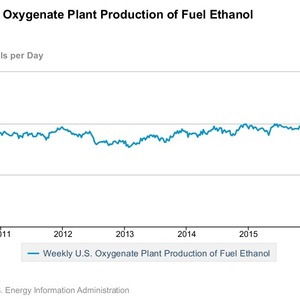EIA maintains 2016, 2017 ethanol forecasts in November STEO

U.S. Energy Information Administration
November 10, 2016
BY Erin Krueger
The U.S. Energy Information Administration has released the November edition of its Short-Term Energy Outlook, predicting fuel ethanol production will average approximately 990,000 barrels per day this year and next year, up from 970,000 barrels per day in 2015. The new outlook maintains the ethanol production forecast made by the EIA in its October STEO.
On a quarterly basis, ethanol production during the fourth quarter of 2016 is expected to average 990,000 barrels per day, down from 1.01 million barrels per day in the third quarter. Ethanol production averaged an estimated 990,000 barrels per day during the first quarter of this year, and 970,000 during the second quarter.
Advertisement
Advertisement
In 2017, ethanol production is expected to average 1 million barrels per day during the first and second quarters, falling to 990,000 barrels per day in the third quarter and 980,000 barrels per day in the fourth quarter.
According to the EIA, average U.S. retail regular gasoline prices increased by 3 cents per gallon in October when compared to September, reaching $2.25 per gallon. With the switch to less-expensive winter gasoline blends and the typical seasonal decline in gasoline consumption, the EIA said gasoline prices are expected to fall to an average of $1.97 per gallon in January. Retail gasoline prices are expected to average $2.13 per gallon in 2016, increasing to $2.27 per gallon in 2017.
The EIA’s most recent weekly data indicates ethanol production reached an average of 1.002 million barrels per day the week ending Nov. 4, down from 1.022 million barrels per day the week ending Nov. 28.
Advertisement
Advertisement
The most recent monthly data shows the U.S. imported 225,000 barrels of ethanol in August, down from 314,000 barrels in July. All imports in both months came from Brazil. Ethanol exports reached 1.856 million barrels in August, up from 1.652 million barrels in July. Brazil, Canada and India were the top designations for U.S. ethanol exports in August.
Related Stories
Avfuel Corp., the leading independent supplier of aviation fuel and services, is expanding its sustainable aviation fuel (SAF) footprint with the addition of a new, strategic supply point in Denver, Colorado—the first of its kind in the region.
CVR Energy Inc. on July 30 reported its renewables segment achieved increased throughput during Q2 despite unplanned downtime but reported a net loss of $11 million. The company expects to retroactively claim the 45Z credit for volumes produced.
Total U.S. operable biofuels production capacity expanded in May, with gains for renewable diesel and a small decrease for ethanol, according to data released by the U.S. Energy Information Administration. Feedstock consumption was up.
SAF-producer XCF Global Inc. on July 28 announced it has signed an exclusive, non-binding indication of intent (IOI) with a renewable fuels infrastructure and feedstock solutions company based in the western U.S.
The European Commission on July 28 approved a €36 million ($41.07 million) Danish state aid scheme designed to encourage airlines operating in Denmark to use sustainable aviation fuel (SAF) on domestic routes.
Upcoming Events










